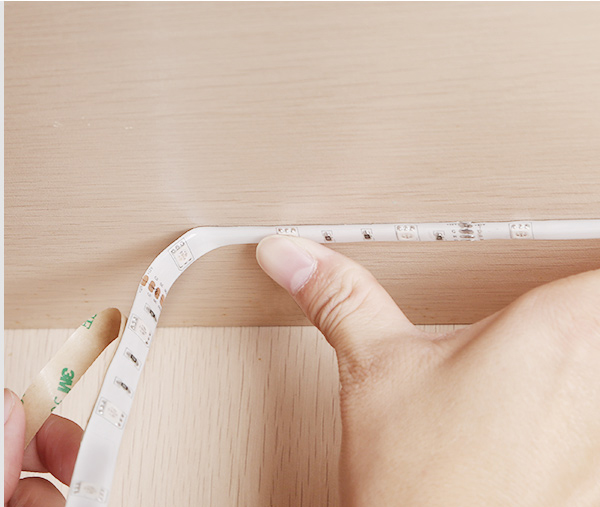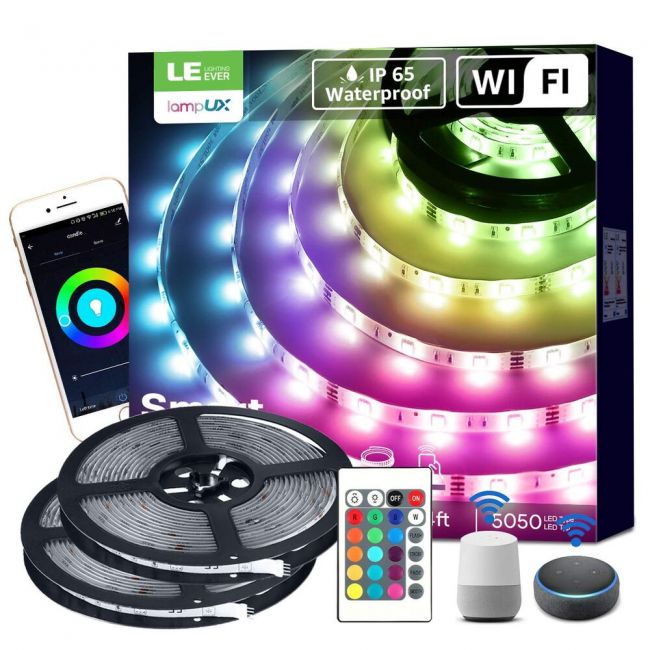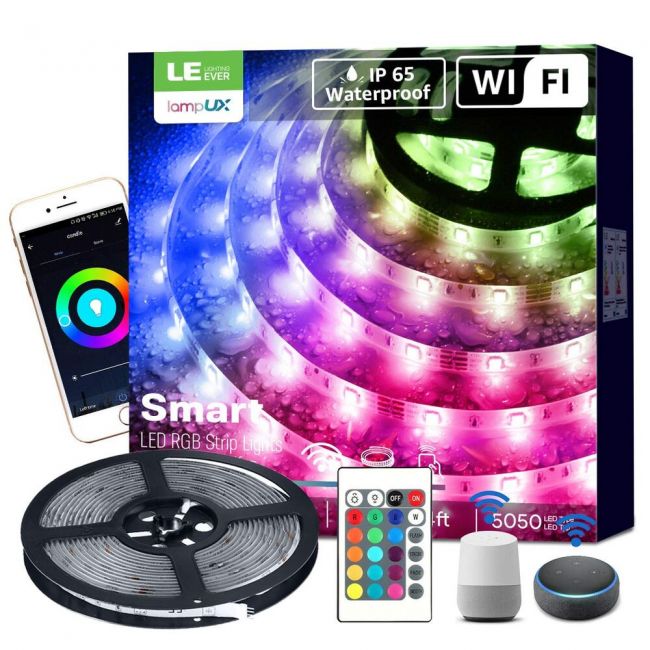Q: I would like a waterproof LED strip light, but how can I identify if an LED strip light is waterproof?
A: Generally speaking, when you’re purchasing an LED strip light, you can see its level of waterproofing on the part that presents the product details. Overall, it is mainly divided into non-waterproof, waterproof against drops and splashes, and completely waterproof.
IP20 basically represents that it is not waterproof, suggesting that you not use it indoors where it could get wet with water.
IP65 and IP66 indicate that it is semi-waterproof, so you can put it under water and wash it, but you cannot soak it in water constantly.
IP67 indicates that it is waterproof; you can immerse it in water for a short period of time outdoors.
IP68 indicates that the level of waterproofing is higher and that you can immerse it in water for a long time.
If you are only using it indoors, there are water drops and splashes, and so a waterproofing level of IP65 basically is good enough. If you would like to install it in a place where it will be submerged in water for a long time, then we suggest that you utilize an LED strip light with a level of waterproofing of IP68.
Part 1. When Do We Need Waterproof LED Strip Lights
Part 2. How to Install Waterproof LED Strip Lights
Part 3. Why Choose Lepro Waterproof LED Strip Lights
Part 4. Understanding the IP Protection Level
Part 1. When Do We Need Waterproof LED Strip Lights?
How to discern whether or not we need to purchase waterproof LED strip lights? It’s mainly based on the location where you install them.
As far as indoors, if you’d like to install the LED strip lights in your bedroom, living room, or all around some furniture as background lights, then you basically don’t need the waterproofing feature. You can just directly purchase non-waterproof LED strip lights; this way, you won’t need as much of a budget, either. If you’d like to install them in your kitchen, bathroom, or other places where often there are splashes of water, we suggest that you purchase strip lights with a protection level of IP65. If you want to ask whether or not you need to purchase strip lights with a protection level of IP67 or even IP68, my suggestion is that there isn’t so much of a need for that; unless you need to constantly soak the strip light in water, generally it’s relatively rare indoors.

If you are getting ready to install the strip lights in a swimming pool, fish tank, and other places directly immersed under water, or to install them outdoors directly exposed to the outside, it might be able to withstand getting soaked under heavy rain for a long time, and we suggest that you go ahead and purchase strip lights with the highest protection level, IP68. If they’re outdoors but there are some coverings and they won’t be soaked for a long time in water, then you can also just purchase LED strip lights with a bit lower of a protection level.

Part 2. How to Install Waterproof LED Strip Lights
There are different categories of LED strip lights, such as 12V LED strip lights and 120V LED strip lights, and their methods of installation differ. Let’s take the Lepro LED 12V strip light for instance and teach you how to install waterproof 12V LED strip lights indoors. Actually, if you purchase non-waterproof LED strip lights, the installation process is also the same.
Step 1. Clean walls/object surfaces
No matter whether you’d like to install the LED strip lights onto the ceiling of your bathroom, the bottom of your bathtub, or behind your mirror, the very first step is to ensure that the surface is dry and clean. Otherwise, the 3M super glue on the back of the LED strip light will not be able to adhere to where you’d like to install it.

Step 2. Tear off the 3M super glue, and stick on the strip light
After cleaning up, you can go ahead and tear off the 3M super glue on the back of the LED strip light and stick the strip light onto the location that you have chosen. After sticking it on, if there is an excess portion, you can use scissors to cut the strip light where there are cutting marks. You can also take measurements before sticking it on, preparing a strip light of a suitable length before then sticking it on.

Step 3. Connect the strip light and the controller
If you have purchased a strip light set, there will be illustrations inside of the connector, helping you to connect your strip light and controller. The other end of the controller connects to the power.
Step 4. Hook up to power, illuminate the strip light
The last step is to hook the controller up to the power, and then you can use the remote control to light up the strip light.

If you are worried that the strip light will not be able to stick to the wall due to water soakage, then you can use the strip light securing clip to affix it. If you would like to learn how to install waterproof LED 120V strip lights, you can click to check out more information.
Part 3. Why Choose Lepro Waterproof LED Strip Lights
In the market, there are many waterproof LED strip lights. Why choose Lepro?
First of all, Lepro is a brand that has been working tirelessly for over ten years as an LED illumination business, and our control over product quality is especially rigorous, devoting our energies to allow people to enjoy the coolest illumination experiences, and we are extremely popular with consumers thanks to the outstanding quality and reasonable pricing of the products under our brand.
Second of all, there is quite an abundance of Lepro LED strip light product types, satisfying various demands. Besides whether or not you need waterproofing features, the LED strip lights have even more features that you can choose from, such as there being a single color or RGB color, being able to manipulate the smart controls with your cell phone, following the beat of music, and the like, all of which can be customized at will according to your needs. If you so require, you can click on and check out the LED strip lights categories to find out more.
Apart from this, Lepro values user experience very much. Besides providing professional customer service, if you are not satisfied with a product, you may return it for a refund within 30 days.
Part 4. Understanding the IP Protection Level
IP protection levels consist of two numbers. The first number indicates the light’s level of dustproofing and prevention of penetration by foreign objects. The second number indicates the light’s degree of moisture proofing and of airtightness in preventing penetration by water. The higher the number is, the higher its protection level is.
| Dustproofing Level | Waterproofing Level | |
| 0 | No Production | No Production |
| 1 | Prevents large solids from entering | Unaffected by water droplets dripping onto the outer covering |
| 2 | Prevents medium-sized solids from entering | Unaffected by water droplets dripping onto the outer covering when the outer covering tilts at 15 degrees |
| 3 | Prevents small solids from entering | Prevents splashing water from seeping in |
| 4 | Prevents solids larger than 1mm from entering | Prevents sprayed water from seeping in |
| 5 | Prevents harmful dust from accumulating | No damage whatsoever if you wash it with water |
| 6 | Completely prevents dust from entering | Prevents big waves from seeping in |
| 7 | Can be used to resist penetration by water for short periods of time | |
| 8 | Soaks for a long time under a certain amount of pressure |

